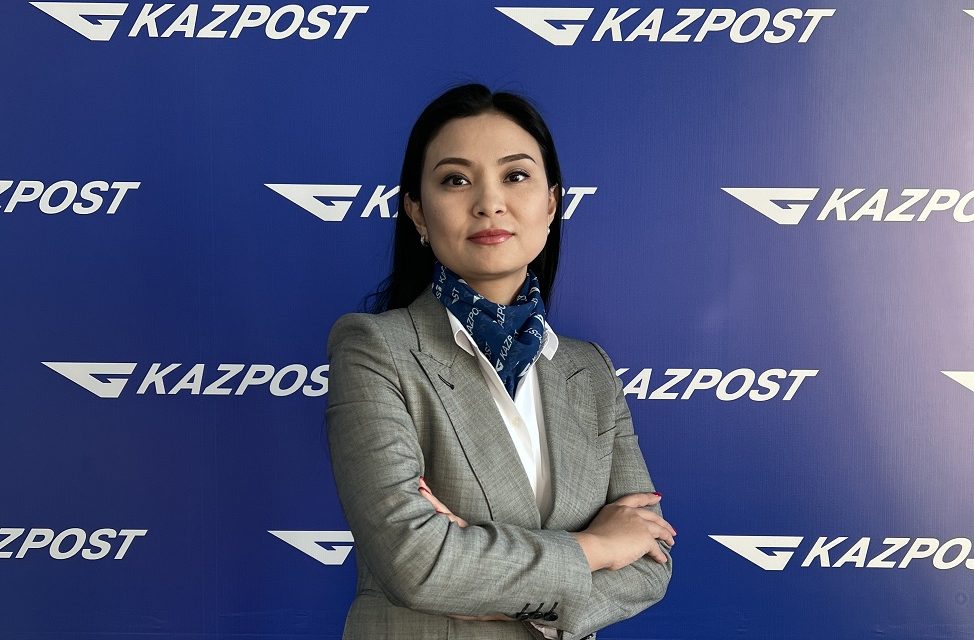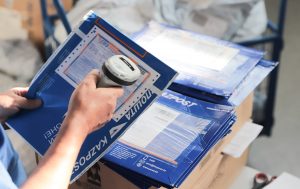
Creating a New Silk Way for postal services

We spoke to Mrs Assel Zhanassova, CEO of Kazpost – the national postal operator in the Republic of Kazakhstan about her passion for staff retention,the importance of connecting rural communities to the cities via e-commerce and her ambitions to create more partnerships with other postal operators.
Can you tell me about Kazpost?
 Kazpost has a huge infrastructure in terms of branches, people and transport that can be developed in order to drive e-commerce and connect people living in rural areas, with cities.
Kazpost has a huge infrastructure in terms of branches, people and transport that can be developed in order to drive e-commerce and connect people living in rural areas, with cities.
The postal service in Kazakhstan has been facing huge challenges over the last few years, and it has been losing market share due to new startups in logistics and delivery services, as well as the emergence of digital banking. As a result, Kazpost has started to lose profit and revenue. I started as CEO at Kazpost in October 2022. Because of my strong background in technology, I was brought in to create a digital strategy which will change our business model and help us survive in this competitive environment. It is a great opportunity for me and it is not too late to turn Kazpost around.
What stage of digitalization is Kazpost?
So the postal service itself is digitalised and in a pretty good shape – you can trace and track your parcels in real time. However, we need to embrace new technologies, AI and advanced analytics – there is a lot that can be done in terms of improving efficiencies and improving predictability. In 2022, we sent over 11 million letters and 5 million parcels. On average we handled around 970, 000 letters and 416, 000 parcels per month.
How will the advanced analytics help?
Because within the postal service there are different services we provide, and the analytics will help us to adapt quickly to the kind of client base we have. It will also help us to focus on how and where we can improve our sales. Now there is a lot of data but it isn’t being used to our full advantage. So the next stage is to use AI to see how we can improve our processes.
What are your other priorities for the Post?
Kazakhstan is the 9th biggest country in the world, so our company is the platform to deliver services and goods to 4 million people in rural areas.
Many postal operators face problems with social responsibility for the people who work for them on low salaries. We have around 20,000 people who work for Kazpost but I do not believe you should fire people even when the postal service is facing challenges. We need to create new revenue streams and prioritise activities, which can help us keep staff and ensure their salaries reflect the rate of inflation. Our key asset is people. Also in rural areas we have 7 000 people working in the field. As a socially responsible company, we are keen to develop and bring new profitable services in order to hire more people. For example from 2023, we will be delivering government services in rural branches, which means we will be paying more to the existing staff.
How can you make that financially plausible?
We want to collaborate with different technology companies eg local QR payment start-ups or local taxi delivery services and follow an omni channel strategy. So for example, in order to persuade people to download our app Post.kz, we will research the most popular applications, and then embed our services into them. For example we know people already use Yandex delivery, one of the most popular services in Kazakhstan.
I’d also like to have more parcel lockers to improve the delivery experience for our clients and locate the lockers in places like shopping malls or as close to their houses as possible to make them more convenient / more likely to be used.
Are there opportunities to work with some of the delivery start-ups you are currently in competition with?
Yes. There are local delivery companies that deliver to the biggest cities, but they don’t have a presence in the rest of the country. As Kazakhstan is the largest country in Central Asia, not every start-up is capable of providing its service to every part of the country. So this is our opportunity – to partner with them and deliver services together. This way we can draw on their client base , and then at the back end, we can provide our services. We don’t always have to be the customer facing partner to make a profit.
As the first CEO in Kazakhstan Post’s history, how important is it for you to promote women in the sector?
I think we have a social responsibility to promote women in management positions but in order to do that we need to create special programmes only for women, to educate them as the leaders, educate them in the corporate policy. It’s all the capability building and from that we can help women to be promoted. There is an existing program for executive level women to improve their corporate management skills and capabilities. In addition, we would like to launch the same programme for women in mid-level management .
What specific geographical challenges does Kazpost have to manage?
 The sheer distances and the weather conditions are our biggest challenges, which can affect business processes and delivery times. Currently it is winter – and even now some of the bigger roads are closed because it is dangerous to drive. From December to the end of February we can have some really very cold days – it can go down to -35. Moreover, the snow is very disruptive, for example 45 flights were cancelled a couple of weeks ago.
The sheer distances and the weather conditions are our biggest challenges, which can affect business processes and delivery times. Currently it is winter – and even now some of the bigger roads are closed because it is dangerous to drive. From December to the end of February we can have some really very cold days – it can go down to -35. Moreover, the snow is very disruptive, for example 45 flights were cancelled a couple of weeks ago.
Delivery usually stops as there are no proper roads in several rural areas and sometimes we have to deliver by horse.
How digitalised is Kazakhstan in general?
Mobile phone penetration and internet accessibility is high. We are very digitised in terms of government services – you can access all services through your mobile. Our banking tends to be done online – I can’t remember the last time I visited a branch. There are two aspects to this – we need to increase the offerings in our postal branches to increase footfall and also we need to increase the quality of our banking services because people are used to using high quality digital services on a daily basis so their expectations are high. Customers expect everything to be done quickly in a couple of steps so when a provider doesn’t offer a good service they will reject the bank. Customers require fully digital banking services with one click service in one app, they want quick and easy acceptance at merchant level like QR payments. That is challenging. As people want to pay for every service in their day-to-day life from one app physically and remotely.
How do you envisage the Post developing with you as CEO?
 So we have three main strategies. The first strategy is to provide best in class postal services in Kazakhstan. To do that we have to be digital and provide real time tracking services, 1st and last mile collection services and payments and provide the quality services that our customers expect and require. Secondly, we would like to play our role in extending the reach of e-commerce. So today, only citizens from the biggest cities in Kazakhstan can purchase or buy from online marketplaces, and people living in rural areas are not really engaged with e-commerce. We would like to develop the digital infrastructure to provide goods and services to rural population. Today, they need to go to the cities to buy products and goods. We can reduce the price of goods because the logistics cost will be lower than the rest.
So we have three main strategies. The first strategy is to provide best in class postal services in Kazakhstan. To do that we have to be digital and provide real time tracking services, 1st and last mile collection services and payments and provide the quality services that our customers expect and require. Secondly, we would like to play our role in extending the reach of e-commerce. So today, only citizens from the biggest cities in Kazakhstan can purchase or buy from online marketplaces, and people living in rural areas are not really engaged with e-commerce. We would like to develop the digital infrastructure to provide goods and services to rural population. Today, they need to go to the cities to buy products and goods. We can reduce the price of goods because the logistics cost will be lower than the rest.
What proportion of Kazakhstan is rural?
4 million people live in rural spaces and we have lots of small agricultural businesses. Our country is very big and the Post has a responsibility to deliver five times a week, -this includes reaching the furthest areas. Our ambition is to be the organisation to bring goods and services directly to people’s homes across the country. And it’s a two-way process because we can also enable trade from rural areas towards the cities. We can help rural businesses by creating e-commerce education centres at our branches and educating the rural population how to onboard and sell products on marketplaces. In order to develop this infrastructure we’re partnering with global and international marketplaces such as Aliexpress, Wildberries and Clever. We’re not going to create our own marketplace, as some of the postal services are doing. It is not a core business for us and requires huge resources to develop and operate. Certainly, we won’t be able to compete with rest of them.
How do you want to change how Kazakhstan does business?
Many online shops do not deliver to Kazakhstan and that’s why we need to work and partner with other postal countries where they already have that integration, and enable them to deliver to our country. We recently joined the UPU and are forming lots of new partnerships.
And will that help with your e-commerce ambitions?
Yes, for example, we were working with Omniva in a partnership so we can now deliver from the UK. We would like to increase our partnerships with other postal services to give our citizens access to global products.
Which other countries are you trying to target?
We need to focus on our biggest market – which is Central Asia – home to 200 million people. We’re currently working with Amazon to enable delivery within five days to Central Asia countries, and enable our local businesses to sell on Amazon and enable quick delivery to other parts of the world too.
How are you affected by the war in Ukraine?
So many supply chains used to go through Russia so we are having to adapt quickly to meet this shift in the market. We are working on a new supply chain to help neighbouring countries deliver their goods directly from their countries. And, we are working with our postal partners and other countries to open up the doors and enable customers to buy all the goods they want. Many are looking to use distribution centres like Turkey or UAE and there are people who used to order items from Russia who now need to find other retailers globally.
What do you want to tell other postal operators about Kazakhstan?
We would like to deepen our partnerships. For example, we have started working with the Omniva in Estonia and we’d like to deepen our partnerships with other countries too. For operators it is very important to have real time data and this is only available when each partner can integrate with each other. I see Kazakhstan as the heart connecting Europe, US, and Asia.
I think a lot of countries don’t understand the role of Kazakhstan in global supply chains. And I would invite everyone to rethink a new way of doing logistics through the Central Asian region. We are very open to partnerships and envisage creating a New Silk Way for postal services, through Kazakhstan.
We have conducted some research which has shown we can deliver from China to the US in just four days using our logistics partners. We can be another supply chain for major economies. We’re inviting everyone, not only postal services, but all global economic players , to partner with us.
About Assel Zhanassova
Assel Zhanassova was Vice Minister of Trade and Integration and was responsible for digitalisation of trade, development of payment systems and digital banking.
Assel Zhanassova has more than 10 years of experience in implementation of local and international IT projects.
In 2010, she obtained a bachelor’s degree in Computer Science from the University of Cambridge under the Bolashak International Presidential Scholarship. In 2014, she got her Master’s degree in Computer Science from the University of Cambridge. In the same year she graduated from the Moscow State Lomonosov University under Executive Management program.
In 2010-2014, Assel Zhanassova was the Director of the IT Security Department at the Eurasian Natural Resources Corporation PLC in London. She was responsible for implementing large strategic projects in Kazakhstan, Africa, Europe, China and Russia.
In 2014-2016, she was Advisor to the Director of the Bank Service Bureau of the National Bank of Kazakhstan, Deputy Director of the Digital Technologies Department of the National Bank of Kazakhstan.
In 2016-2017, she was CEO of JSC Zerde National Holding.
From 2017 to 2018, she was Advisor to the Governor of Astana International Financial Center. Prior to the appointment as Vice Minister of Trade and Integration, from 2018 to 2020 she was AIFC Chief Digital Officer.










